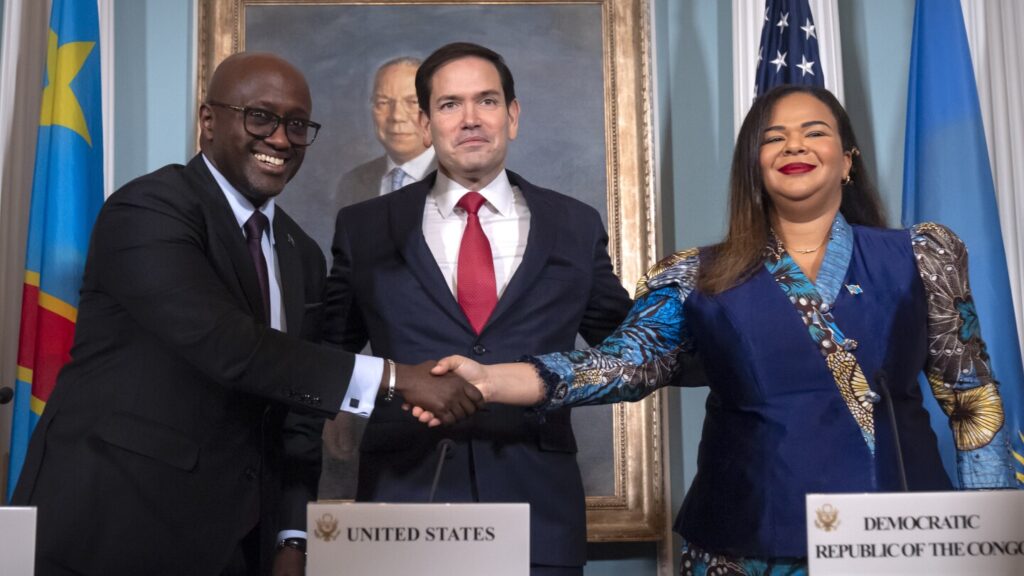
WASHINGTON (AP) — The Democratic Republic of Congo and Rwanda have signed a peace agreement on Friday, mediated by the United States, aiming to quell the decades-long conflict in eastern Congo. This deal also opens avenues for the U.S. government and American companies to access critical minerals in the region.
“Today, the violence and destruction comes to an end, and the entire region begins a new chapter of hope and opportunity, harmony, prosperity and peace,” President Donald Trump declared to the foreign ministers of both nations during a White House meeting.
Historical Context and Agreement Details
The agreement, signed at the State Department’s Treaty Room under the watchful eyes of a portrait of Colin Powell, marks a significant diplomatic effort. Secretary of State Marco Rubio described it as “an important moment after 30 years of war.”
The Central African nation of Congo has been embroiled in conflict involving over 100 armed groups, with the most potent factions receiving support from Rwanda. These conflicts have resulted in millions of deaths since the 1990s. Despite the signing of the deal, analysts remain skeptical about an immediate cessation of hostilities, particularly as the prominent armed group, M23, claims the agreement does not apply to them.
“Some wounds will heal, but they will never fully disappear,” said Congo’s Foreign Minister Therese Kayikwamba Wagner. “Those who have suffered the most are watching. They are expecting this agreement to be respected, and we cannot fail them.”
Challenges and Skepticism
Rwanda’s Foreign Minister Olivier Nduhungirehe highlighted the “great deal of uncertainty” due to the failure of previous agreements. “There is no doubt that the road ahead will not be easy,” he stated. However, he expressed hope that with continued U.S. support, a turning point has been reached.
The agreement includes provisions on territorial integrity, prohibition of hostilities, and the disengagement, disarmament, and conditional integration of non-state armed groups. Despite these measures, the M23 rebel group, which has been a significant player in the conflict, has indicated that the peace deal might not be binding for them.
“Anything regarding us which are done without us, it’s against us,” stated Corneille Nangaa, leader of the Congo River Alliance, which includes M23.
Geopolitical Implications and Mineral Interests
The peace deal is intricately tied to the U.S. strategic interests in the region, particularly in countering China’s influence in Africa. The U.S. has been keen on accessing Congo’s vast mineral resources, crucial for technology production. The Department of Commerce estimates these untapped minerals could be worth up to $24 trillion.
For years, Chinese companies have dominated Congo’s mineral sector, with Chinese cobalt refineries accounting for a significant portion of the global supply. The U.S. involvement in the peace process is seen by some as a move to shift this balance.
Christian Moleka, a political scientist at the Congolese think tank Dypol, called the deal a “major turning point” but cautioned that it “could in no way eliminate all the issues of the conflict.”
Future Prospects and Historical Parallels
The conflict in eastern Congo can be traced back to the aftermath of the 1994 Rwandan genocide, which saw nearly 2 million Hutus flee into Congo. This exodus has been a source of tension, with Rwanda accusing some of these Hutus of participating in the genocide and alleging protection by elements within the Congolese army.
Since then, the conflict has claimed over 6 million lives due to violence, famine, and disease outbreaks. The United Nations has described it as “one of the most protracted, complex, serious humanitarian crises on Earth.”
While the peace deal offers a glimmer of hope, the path to lasting peace remains fraught with challenges. Activists in Congo’s North Kivu province, the epicenter of the conflict, emphasize the need for justice to accompany peace efforts.
“I don’t think the Americans should be trusted 100%,” said Hope Muhinuka, a local activist. “It is up to us to capitalize on all we have now as an opportunity.”
As the world watches, the success of this peace agreement will depend on its implementation and the international community’s commitment to addressing the underlying issues of justice and economic exploitation.
Asadu reported from Dakar, Senegal. Edith M. Lederer at the United Nations, Justin Kabumba in Goma, Congo, Ignatius Ssuuna in Kigali, Rwanda, and Mike Pesoli and River Zhi-Hui Zhang in Washington contributed to this report.






